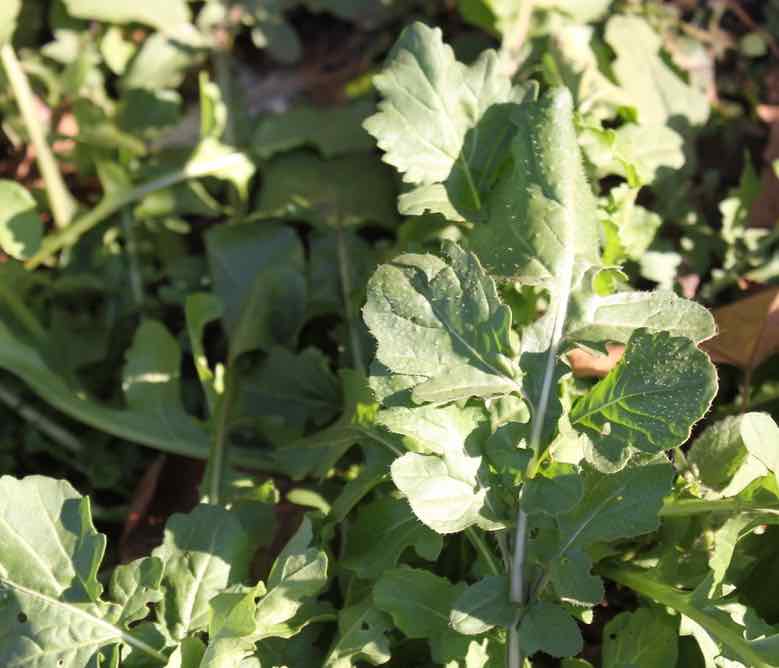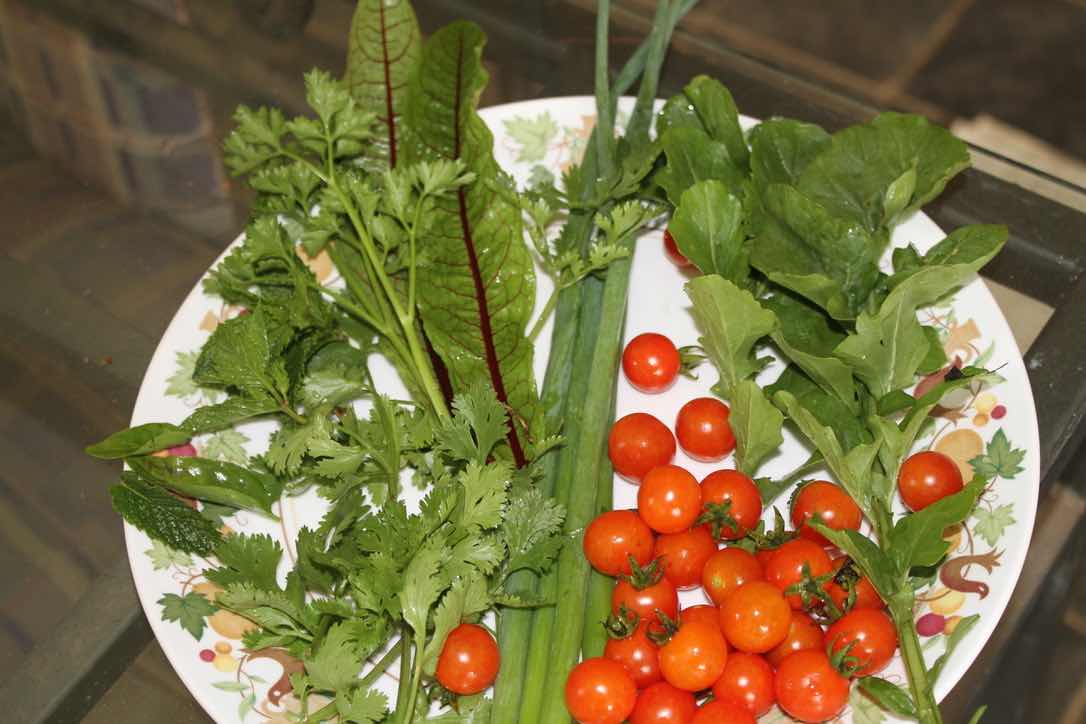- Bernard Preston homepage
- Herbs Spices
- Grow Your Own Rocket
Grow your own rocket
Grow your own rocket because of its sulforaphane, folate and vitamin-K.
Rocket like most vegetables enjoys full-sun, but then you will have to water it regularly; it wilts very quickly if the soil dries out. Partial shade is acceptable.
A row one-metre long will provide you with a massive amount of greens if you plant the seeds thickly; if you have the space in your garden spread them out more thinly.

Rocket of course likes a rich soil with plenty of well-rotted compost to which we always add a little humus from our worm farms; it makes an astonishing difference.
Break up any clods and rake the enriched soil until it is fairly smooth. This is not a herb that you must first set in a seed bed, and then transplant.
That I find laborious and it sets the little plants back by several weeks.
Using your garden fork draw out a line about a centimetre deep and drop the seeds in thinly; cover with fine soil and water them in. It is good to dampen the bed each day until the young plants appear.
They grow quickly and in warm-weather you will be picking the young leaves within a few weeks. It does well in a mild winter too and will go on bearing for months.
Grow your own rocket
Grow your own rocket because it will give your family fresh-greens straight from the garden every day for your salad.
That slipped so easily off the nib of my pen, figuratively speaking, but seriously do you have a salad most days? There is so much research on the benefits of dark-green leafy vegetables; just google it.
One must acknowledge that rocket is a bit of an acquired taste. To begin with use only the young-shoots in your salads; as your family becomes accustomed to the flavour you can start adding the older greens which have a stronger bite.
With olive oil, balsamic vinegar and feta-cheese you will have a salad that will set the tongues of your guests wagging.
Would a rose smell less sweet by any other name?
So too rocket by any other name, like arugula, would taste just as good. It was a very commonly used herb in ages past but lost its popularity until more recent times. Now we grow it every year; one more coloured-food you can add to your count.
Those who enjoy at least seven different coloured salads and fruits every day, researchers have found have over a 30 percent lower all-cause of death; that is massive.
The reasons are complex but it is most likely because of the anti-inflammatory properties and the richness of the phytochemicals and vitamins; thus we enjoy a greater sense of wellness.
Rocket pesto
Pesto is traditionally made with sweet-basil, but for a variation try using rocket as the herb. I am never tied down by a recipe, and differing adventures and experiments are what make for fun in the kitchen.
What is basil will tell your more if you are at a loss at how to make rocket-pesto.
Sulphoraphane
Greens like broccoli, cabbage and rocket contain a potent phytonutrient called glucoraphanin which has been strongly linked to our well-being.
This is the inactive form and the sulphoraphane is only released when the leaves are crushed, producing an enzyme that acts on the compound.
The moral of the story is that your greens need to be chopped and thoroughly chewed to get the full benefit of sulphoraphane.
Sulphoraphane has been shown in numerous studies to reduce the uncontrolled proliferation of cells in tumours[1].
Population
studies have shown that groups of people who enjoy their greens, even just once a week, have a statistically significant reduced risk of
tumours. In
particular those like rocket and broccoli that are rich in
glucoraphanin are the most effective[2].
They also have less cardiovascular disease and better digestion. The extra fibre means a happy colon for the massive number of beneficial bacteria that live in the gut.
Did you know that this microbiome, as it is known, has a mass of around 2 kg in the happy tum? They make up ten times as many cells as there are in the whole body, contributing vitamins like B12 and a host of important substances such as short-chain fatty acids; it is a complex subject. Scientists have only examined the tip of the iceberg.
Cardiovascular disease
Cardiovascular disease remains the chief cause of death. Researchers have shown that it is caused by "oxidative stress" by reactive chemicals that causes damage to the heart muscle and the lining of blood vessels.
Recent research shows that those greens containing glucoraphanin, producing sulforaphane, give protection against cardiovascular disease by its anti-inflammatory properties and those resisting oxidation[3].
Newsletter
Our newsletter is entitled "create a cyan zone" at your home, preserving both yourself and Mother Earth for future generations; and the family too, of course. We promise not to spam you with daily emails promoting various products. You may get an occasional nudge to buy one of my books.
Here are the back issues.
- Lifestyle and ideal body weight
- What are ultra-processed foods?
- Investing in long-term health
- Diseases from plastic exposure
- Intensive lifestyle management for obesity has limited value
- A world largely devoid of Parkinson's Disease
- The impact of friendly bacteria in the tum on the prevention of cancer
- There's a hole in the bucket
- Everyone is talking about weight loss drugs
- Pull the sweet tooth
- If you suffer from heartburn plant a susu
- Refined maize meal and stunting
- Should agriculture and industry get priority for water and electricity?
- Nature is calling
- Mill your own flour
- Bake your own sourdough bread
- Microplastics from our water
- Alternative types of water storage
- Wear your clothes out
- Comfort foods
- Create a bee-friendly environment
- Go to bed slightly hungry
- Keep bees
- Blue zone folk are religious
- Reduce plastic waste
- Family is important
- What can go in compost?
- Grow broad beans for longevity
- Harvest and store sunshine
- Blue zone exercise
- Harvest and store your rainwater
- Create a cyan zone at your home
Grow your own rocket

If you grow your own rocket, and other greens, of course, it will have a massively beneficial effect on your well-being.
One reads regularly of cooks expounding on a salad that has no lettuce; usually they have substituted a refined starch.
But let us admit that a lettuce and tomato salad is very dull, particularly if the greens are not freshly-picked, which they usually are not. Adding several different herbs like rocket, spring onions and radishes, for example, is the way to make our meals more appetising.
Often we harvest too much and some is left over; by the next day it looks awful. Do not buy it; grow your own rocket. It is so easy, and enjoy it freshly-picked.
Often it will seed itself, and come up again next spring.
References
When browsing use right click and "Open Link in New Tab" or you may get a bad gateway signal.
Did you find this page interesting? How about forwarding it to a friendly book or food junkie? Better still, a social media tick would help.
- Bernard Preston homepage
- Herbs Spices
- Grow Your Own Rocket
Address:
56 Groenekloof Rd,
Hilton, KZN
South Africa
Website:
https://www.bernard-preston.com